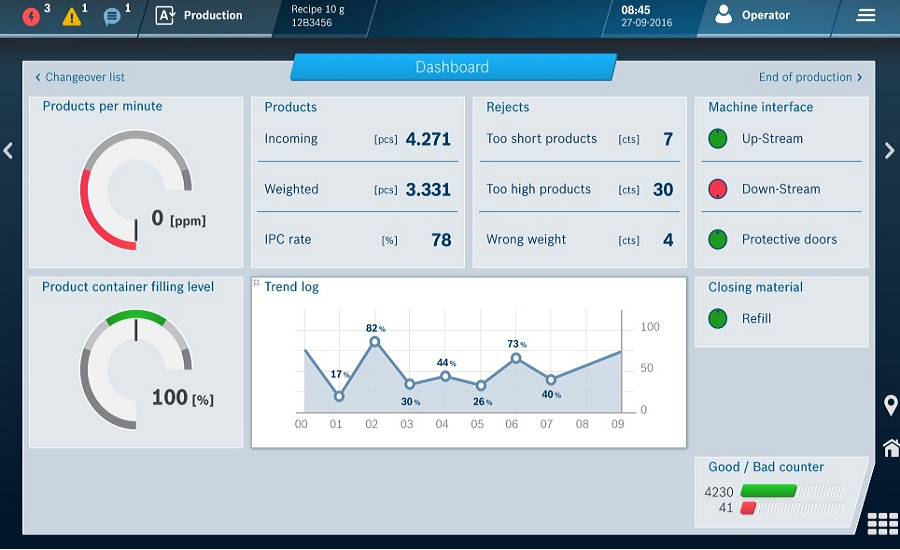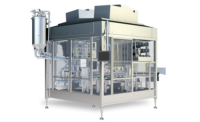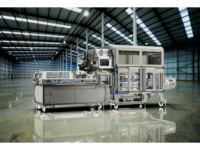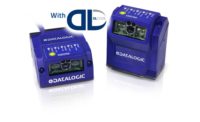Bosch Packaging Technology presents HMI of the next generation

Bosch Packaging Technology (bosch.com) presents its latest development: the next generation Human Machine Interface HMI 4.0. The HMI 4.0 is suited for both stand-alone machines and entire lines and is part of Bosch’s industry 4.0 applications. For instance, it provides an interface for data collection, data sharing and visualization.
As of Interpack 2017, Bosch will successively equip all new machines of its processing and packaging units with the HMI 4.0. “This is a revolutionary innovation. The aim is to ensure that all our machines feature the latest hardware and control technology, and also provide a consistent user guidance with the same comprehensible surface,” says Stefan König, member of the board of management at Bosch Packaging Technology. “Thereby, Bosch not only explores new horizons with regard to design but also sets a milestone for connected solutions in the processing and packaging industry.”
Improved operation and new functions
A major new feature of the HMI consists in its guided workflows, which lead operators through each step of production processes. The same applies to format changes, cleaning and maintenance as well as other processes. This facilitates the daily work. The display resembles that of mobile devices like smartphones or tablets. Thanks to an intuitive, touch-sensitive surface, data can be entered with gestures (multi-touch), including zooming in and out with two fingers – “pinch and stretch” – as well as navigation by swiping.
“In future, machines and systems will be easier to operate since operators have a uniform navigation concept with the same basic functions for each machine of a line,” König explains. “Even existing machines may be retrofitted upon request.”
Thanks to a clearly arranged, tile-structured menu, operators will benefit from a quick overview of all functions and processes of their machines. Tailored to specific user roles, such as operator or line manager, the HMI 4.0 only displays the processes relevant to the current user.
The HMI 4.0 provides comprehensive, integrated support as well as more transparent processes and notifications. In case of production downtime, operators immediately receive a notification including information about the causes and troubleshooting support to quickly restart their machines. Direct links to user manuals and format changeover lists assist users in their day-to-day tasks. Furthermore, a new comment section enables users to add their own notes and share them with others.
Tailored to customer needs and industry 4.0 requirements
“The HMI 4.0 provides an immediate overview of all production parameters and data. This is especially important with regard to the big amount of data in the connected industry. During production, all key information is summarized on a central dashboard. With its standardized interfaces, the HMI 4.0 is a central element for the connection to other solutions. This way, our customers are fully prepared for upcoming industry 4.0 challenges,” König says.
Bosch has tailored its HMI 4.0 especially to users’ needs and requirements. Machine operators all over the world were interviewed and operating habits observed, since users are always in the center of Bosch’s developments. This is why customers are continuously involved during development processes including prototyping phases. “The new HMI is already in use on first machines of several customers,” König says. “Their keen feedback has proven that this is the right approach.”
System and line competence for industry 4.0
System and line competence as well as connectivity are essential characteristics of the intelligent factory of tomorrow for all productive divisions of Bosch Packaging Technology. System and line competence implies shifting the focus from a single machine to the entire production line by offering complete solutions. These include multiple production stages, as well as further processes within the production environment and a comprehensive service. Technological progress and the increasing digitization open up numerous opportunities to better connect all parts of the value chain by applying integrated industry 4.0 solutions, and to ensure product quality and long-term operability of machines.
Looking for a reprint of this article?
From high-res PDFs to custom plaques, order your copy today!







